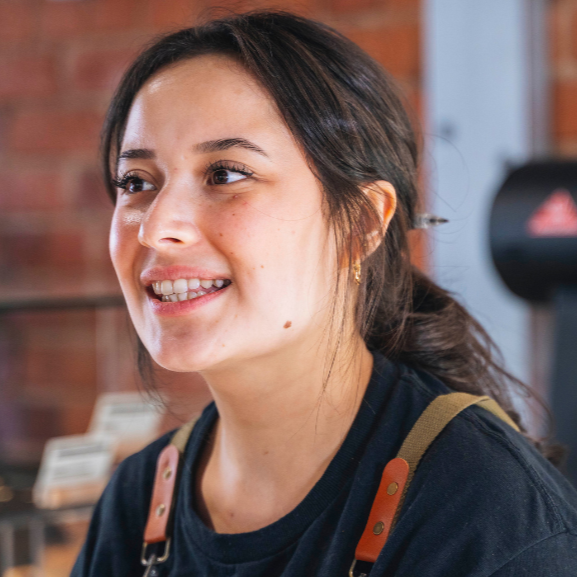Customer Portal

Whole Bean Decaf Coffee
Decaf coffee is becoming increasingly popular as more people opt for decaffeinated coffee to try to reduce their caffeine intake. Our whole decaf coffee beans are washed and undergo a sugarcane E.A decaffeination process.
This is a natural process that maintains the integrity of green coffee flavour while allowing us to offer decaf coffee that follows an integrated vertical supply chain. This is done while the growing, processing, and full decaffeination take place at the source in Colombia.

Why Decaf Coffee?
Although decaf coffee is a popular choice for many, some people avoid decaffeinated coffee as they may think that it will taste as good or as strong as regular coffee. However, this is not the case at Crosby Coffee.
We offer two different types of decaffeinated coffee:
- Decaf Colombia Rainow: Contains milk chocolate, almonds and clementine-tasting notes
- Decaf Colombia Tabi: Contains macadamia and dark caramel tasting notes
Decaf coffee is a great alternative to regular coffee as it allows you to enjoy your daily cup of coffee without experiencing any unwanted side effects.
What Are the Health Benefits of Decaf Coffee
Decaf coffee offers a wide range of health benefits, such as:
- It contains antioxidants associated with reducing the risk of type 2 diabetes
- Improved sleep
- Improved liver health
- No caffeine jitters
- Improved mood and attention
Decaf coffee may reduce the risk of heart disease and is also less harsh on your teeth as regular coffee is more likely to leave stains.
If you are concerned as to whether or not decaf coffee still offers the same benefits and antioxidants as regular coffee, you can rest assured that it does!
What Are the Different Decaffeination Methods?
Different methods can be used to decaffeinate coffee. Here are the five different types of decaffeination methods:
- Carbon dioxide method: This is an organic method that uses Co2 and water to remove caffeine from the beans
- Solvent-based method: This can be through an indirect or direct process
- Ethyl Acetate (EA Sugarcane): This is a popular method as it retains the most flavour profile
- Swiss water process: This method involves soaking the coffee beans in hot water
- Chemical solvent method: This method uses a chemical compound to strip the caffeine molecules from the coffee.
All decaf coffee undergoes one of these processes; however, at Crosby Coffee, we use the sugarcane method as it retains most of the profile of the origin of the coffee as well as being the most natural process.
Whole Bean Decaf Coffee FAQs
Is Decaf Coffee Completely Caffeine Free?
When people hear the term ‘decaf’, they automatically think that this means it is completely caffeine-free. However, this is not always the case. In fact, a typical cup of decaf coffee contains around 2 mg of caffeine. The decaffeination process removes around 97% of caffeine from the coffee bean.
Is Decaf Coffee Good for You?
Decaf coffee offers a wide range of health benefits and is completely safe to drink. Decaf coffee isn’t necessarily bad for you, in fact, it may be a better option for some people. Just make sure that you are aware of how much caffeine you are consuming daily. Up to 400 mg a day appears to be safe for adults to drink according to the FDA.
Is Decaf Coffee Acidic?
Yes, decaf coffee is still slightly acidic, however, the acidity levels are much lower than regular coffee. There are many different types of acids found in coffee, which include:
- Chlorogenic acid
- Citric acid
- Quinic acid
- Acetic acid
- Malic acid
- Phosphoric acid
Hey there! Fancy 10% Off?
Sign up to our newsletter and we'll send you all our latest offers, including 10% off your first coffee order!
















